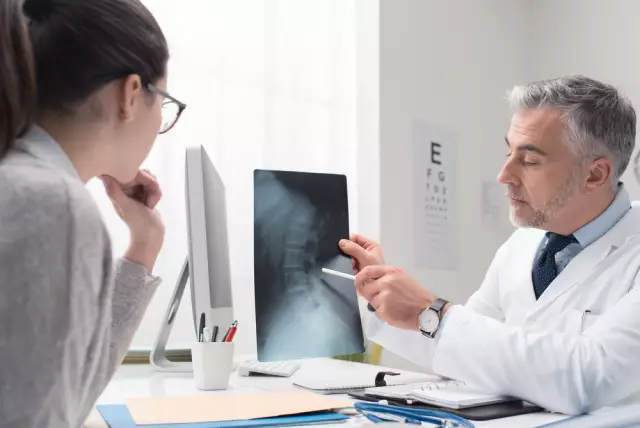- Author Rachel Wainwright wainwright@abchealthonline.com.
- Public 2023-12-15 07:39.
- Last modified 2025-11-02 20:14.
Seborrhea
Brief description of the disease

Seborrhea (seborrheic dermatitis) is a chronic skin disorder associated with the sebaceous glands of the face, skin folds and scalp. Currently, seborrhea has become quite widespread, especially among representatives of the strong half of humanity. The disease causes the sebaceous glands to produce an increased amount of secretions that contain too many fatty acids. As a result, seborrhea, the treatment of which is most often required by young people between the ages of 25 and 27, leads to deformation of the skin, hair loss and other serious consequences.
The disease can develop on the skin of any part of the body, but the most common lesion is the so-called T-shaped zone (seborrhea on the face, affecting the forehead, nose and chin). In addition, the decollete area, that is, the chest and back, is at risk. This localization is explained by the fact that it is on these parts of the body that the largest number of sebaceous glands is located.
Forms of seborrhea
In medicine, it is customary to distinguish two forms of the disease:
- oily seborrhea - manifests itself in increased skin greasiness, a constant sensation of itching and hair loss. Depending on the intensity of the process, a situation may arise in which seborrhea of the head will lead to complete baldness within just a few years, which is very unpleasant in adolescence. In addition, oily seborrhea causes a change in the skin, which becomes grayish and begins to resemble a wrinkled orange peel. Also, with this form of the disease, black spots appear on the skin. Often this process is accompanied by the formation of light yellow cysts - whiteheads.
- dry seborrhea is characterized by brittle hair, dandruff and other defects in the scalp. In these places, our skin is especially sensitive to the composition of water and the action of cosmetics, so it is not surprising that seborrhea makes itself felt in the hairy areas. Frequent washing increases the negative effect of the symptoms of the disease, in particular, contributes to the formation of blackheads, skin tightness and unpleasant itching.
Seborrhea - symptoms of the disease
Both dry seborrhea and oily form of the disease lead to:
- increased fat content of the skin;
- peeling of the skin;
- unpleasant itching;
- hair loss.
In addition to the above symptoms, scalp seborrhea, which should be treated as soon as possible, leads to dandruff. Cell renewal occurs in all people, without exception, but with seborrhea, this activity proceeds many times faster.
Seborrhea - treatment of the disease
If a person is diagnosed with scalp seborrhea, the treatment is similar to the procedures we use to get rid of dandruff. The most effective are shampoos containing zinc pyrithione, salicylic acid, tar, selenium sulfide and ketoconazole. Consider only that with frequent use, selenium sulfide promotes more intense work of the sebaceous glands and can aggravate the course of the disease. In addition to cosmetics, scalp seborrhea is treated with glucocorticosteroids.
With seborrhea, you must follow a strict diet, refuse fried, spicy, spicy and fatty foods. Sweets, including chocolate, are also excluded from the diet. All these products contribute to the production of fat and have a detrimental effect on the condition of the internal organs. Cereals, fruits, vegetable dishes, salads, dressed not with mayonnaise, but with vegetable oil, and dairy products have useful properties.
If a person has seborrhea of the skin, the treatment consists in restoring the normal functioning of the autonomic and digestive systems. For this purpose, the patient is prescribed medications that normalize the digestive tract, multivitamins, trace elements (zinc, sulfur).
In the early stages, local treatment shows very good results. The affected areas of the skin are treated with weak solutions of calendula, salicylic or boric acid, valerian. Lubrication not only cleanses the surface of the skin, but also prevents the development of all kinds of inflammatory reactions. It is recommended to use exfoliating agents along with alcohol-containing solutions. Vitamin and herbal creams, which contain various antiseptic substances, are especially useful. Antifungal drugs are often prescribed to patients, but in the case of seborrhea, they act rather as prophylactic agents that prevent the reappearance of the disease.
YouTube video related to the article:
The information is generalized and provided for informational purposes only. At the first sign of illness, see your doctor. Self-medication is hazardous to health!






